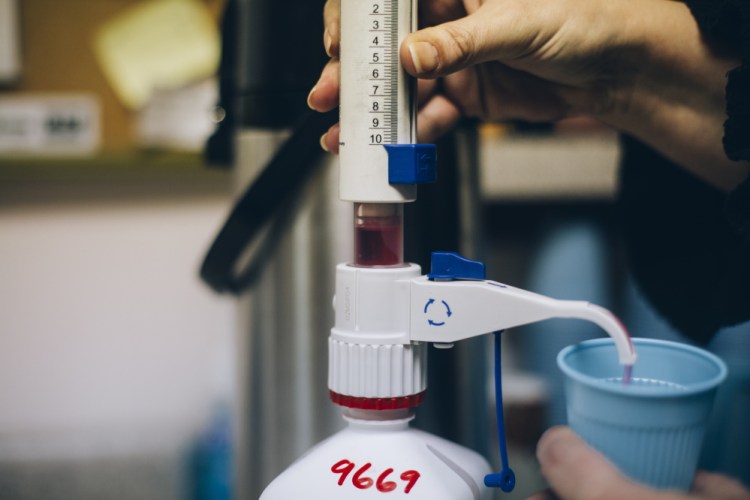The MaineCare reimbursement rate at the state’s 10 methadone clinics would go up under a bill sponsored by a Republican lawmaker from York County, one of several pieces of legislation aimed at tackling the state’s heroin crisis.
The measure proposed by Sen. David Woodsome of North Waterboro would increase the weekly reimbursement rate from $60 to $80 per patient, reversing a cut that was part of a bipartisan budget deal in 2012.
Woodsome said Wednesday that after studying the evidence over the past two years, he’s concluded that methadone is worthy of funding at the higher levels because it’s scientifically proven to be effective in treating opiate addictions.
Maine has experienced a surge in heroin overdose deaths – the state had 71 heroin overdoses through the first nine months of 2015 compared with 57 in all of 2014. Meanwhile, the number of people seeking treatment for opioid addictions increased from 1,115 in 2010 to 3,463 in 2014.
“This is a huge issue throughout Maine. If we’re going to do something, let’s do it right rather than simply throwing money at the problem,” Woodsome said.
The Legislature’s Health and Human Services Committee will hold a public hearing on the bill at 1 p.m. Thursday.
MaineCare is the state’s version of the Medicaid insurance program for low-income residents, funded with a combination of federal and state dollars.
The reimbursement increase would cost the state an estimated $950,000, in addition to the federal government paying an extra $1.7 million to fund the higher reimbursements, according to a fiscal note attached to the bill. Woodsome said the state will save money in other areas, such as reduced law enforcement and incarceration costs.
“If we spend money on this it will save us money in the long run, and we will have a better society,” Woodsome said. “There’s a cost to doing nothing.”
POTENTIAL FOR INCREASED COUNSELING
The Department of Health and Human Services, which oversees MaineCare, did not return messages seeking comment Wednesday on whether it would support the bill.
Last August, a DHHS spokesman said the clinics served 3,858 patients in the 2014 fiscal year, at a cost to MaineCare of $13.9 million.
Part of Woodsome’s district includes Sanford, where a methadone clinic closed last year in part because clinic officials said reimbursement rates were too low to make it a viable business. Spectrum Health Systems opened in January 2014, but closed in August 2015, citing low reimbursement rates and the state’s failure to expand Medicaid as reasons.
Jim Cohen, a Portland attorney who represents the state’s methadone clinics, said if the higher reimbursement rates were approved, it would increase the counseling available to patients and result in more methadone clinics opening.
But Cohen said the reimbursement rate makes it hard for new clinics to get established.
“It’s very difficult when a clinic opens to get the critical mass of patients it needs to be financially viable,” he said. Spectrum had about 150 patients when it closed last year.
Cohen said that after the 2012 reimbursement cut went into effect, the state relaxed requirements to provide substance abuse counseling, allowing one counselor to serve up to 150 patients. Previously, counselors at methadone clinics could see no more than 50 patients.
Cohen said the clinics had to cut back on counseling services when the reimbursement rate was cut, and that having more extensive counseling available would be “critical to help patients in Maine who are experiencing opiate-abuse disorder.”
MORE LEGISLATION IN THE PIPELINE
DHHS Commissioner Mary Mayhew advocated last year for eliminating the methadone reimbursement in favor of treating opiate addicts with Suboxone, another medication that helps addicts stay away from heroin or other opioids.
The proposal failed after the treatment community lobbied against it, pointing out that especially for those with severe opioid addictions, methadone is more effective.
MaineCare enrollment has declined from 355,000 patients in 2011 to 287,000 in 2015 as the LePage administration has tightened eligibility requirements and the state’s economy has emerged from the recession.
Woodsome, who hasn’t had any conversations with administration officials about his bill, said he previously had a negative impression of methadone clinics, but he’s since learned that methadone may be the best choice for some patients.
Sen. Eric Brakey, R-Auburn, the co-chair of the health and human services committee, said he doesn’t have a position on Woodsome’s bill and is looking forward to listening to Thursday’s testimony.
Cohen believes that attitudes toward heroin addiction are changing.
“People are waking up to the reality that addiction is a chronic disease,” Cohen said.
Lawmakers will take up a number of bills during the session that address the addiction epidemic. The Legislature and LePage earlier this month agreed on a bipartisan, $3.7 million bill that added 10 drug enforcement agents in addition to expanding treatment options.
Another measure awaiting debate is a proposal by Portland Democratic Rep. Mark Dion, an attorney and former police officer, to establish a number of pilot programs across the state for police agencies to divert addicts into treatment programs as an alternative to incarceration.
LePage has said he plans to introduce additional proposals for dealing with the drug problem, but he has yet to reveal the details.
Send questions/comments to the editors.




Comments are no longer available on this story